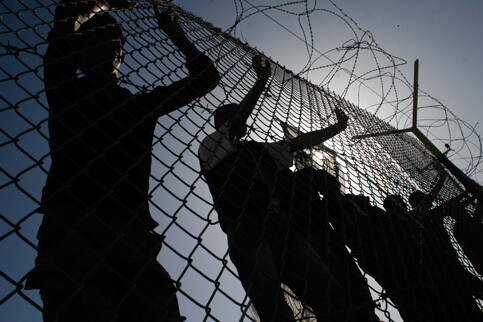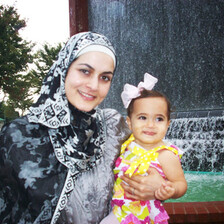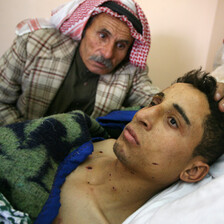North Carolina 27 December 2008

Israeli closures have turned the Gaza Strip into a prison. (Hatem Omar/ MaanImages)
We woke up this morning to the news in Gaza. It seems we always wake up to news there — so it has become a matter of perspective how bad the news is each time; how remote it seems each time; how real or not; how severe and whether the severity warrants an “international outcry” or whether the animals can continue to suffer in their cages for a while longer.
We received a call from my in-laws in Lebanon at an early hour, checking in on my family in Gaza, since they cannot call them directly. We call my parents. My father does not answer. We call his mobile, we reach him. He has just returned from al-Shifa hospital — we hold our breaths.
“We are OK. We went to donate blood and to see if they needed any help” says my father, a retired surgeon.
“We were in the market when the strikes began. I saw the missiles falling and prayed; the earth shook; the smoke rose; the ambulances screamed,” he said, the sirens audible in the background. He was on Talatini street at the time of the attacks, just a few streets down from one of the attack sites.
My mother was in the Red Crescent Society clinic near the universities at the time of the initial wave of attacks, where she works part-time as a pediatrician. Behind the clinic was one of the police centers that was leveled. She said she broke down at first, the sheer proximity of the attacks having shaken her from the inside out. After she got a hold of herself, they took to treating injured victims of the attack, before they transferred them to al-Shifa hospital. There, she said, medical necessities were in short supply: face masks, surgical gloves, gowns, etc.
My parents live in the the Gaza City center, and the Israeli war planes attacked people and locations all around them. More than 50 “targets” by 60 warplanes, read the headline from the Israeli newspaper Haaretz. And more than 220 killed in broad daylight, in the after-school rush.
Like a movie or a game. If you say it enough times, it does not sound real anymore. Fifty targets, 60 warplanes, 200 people, one day.
All very sanitary. Very sleek. Neatly packaged: war in a gift-box.
“There is a funeral passing every minute. The bodies are piling up.”
Gaza’s air is saturated with the acrid smell of burning human flesh. There is panic, as one would imagine dogs would panic in an overcrowded cell when several of their own are violently, abruptly killed. But dead dogs in a cage, however, would create an outcry.
The rains of death continue to fall on Gaza. And silently, we watch. And silently, governments plotted: how shall we make the thunder and clouds rain death onto Gaza? Egypt, the United States, Israel …
And it will all seem, in the end of the day, that they are somehow a response to something. As though the situation were not only acceptable, but normal, stable, in the period prior to whatever this is a response to. As though settlements did not continue to expand; walls did not continue to extend and choke lands and lives; families and friends were not dislocated; life was not paralyzed; people were not exterminated; borders were not sealed and food and light and fuel were in fair supply.
But it is the prisoners’ burden to bear: they broke the conditions of their incarceration. They deviated. But nevertheless, there are concerns for the “humanitarian situation”: as long as they do not starve, everything is OK. Replenish the wheat stocks immediately.
The warden improves the living conditions now and then, in varying degrees of relatively, but the prison doors remain sealed. And so when there are 20 hours of power outages in a row, the prisoners wish that they were only eight; or 10; and dream of the days of four.
Editor’s note: A shorter version of this essay was originally published and the above is the full version.
Laila El-Haddad’s blog is Raising Yousuf and Noor: diary of a Palestinian mother.
Related Links





